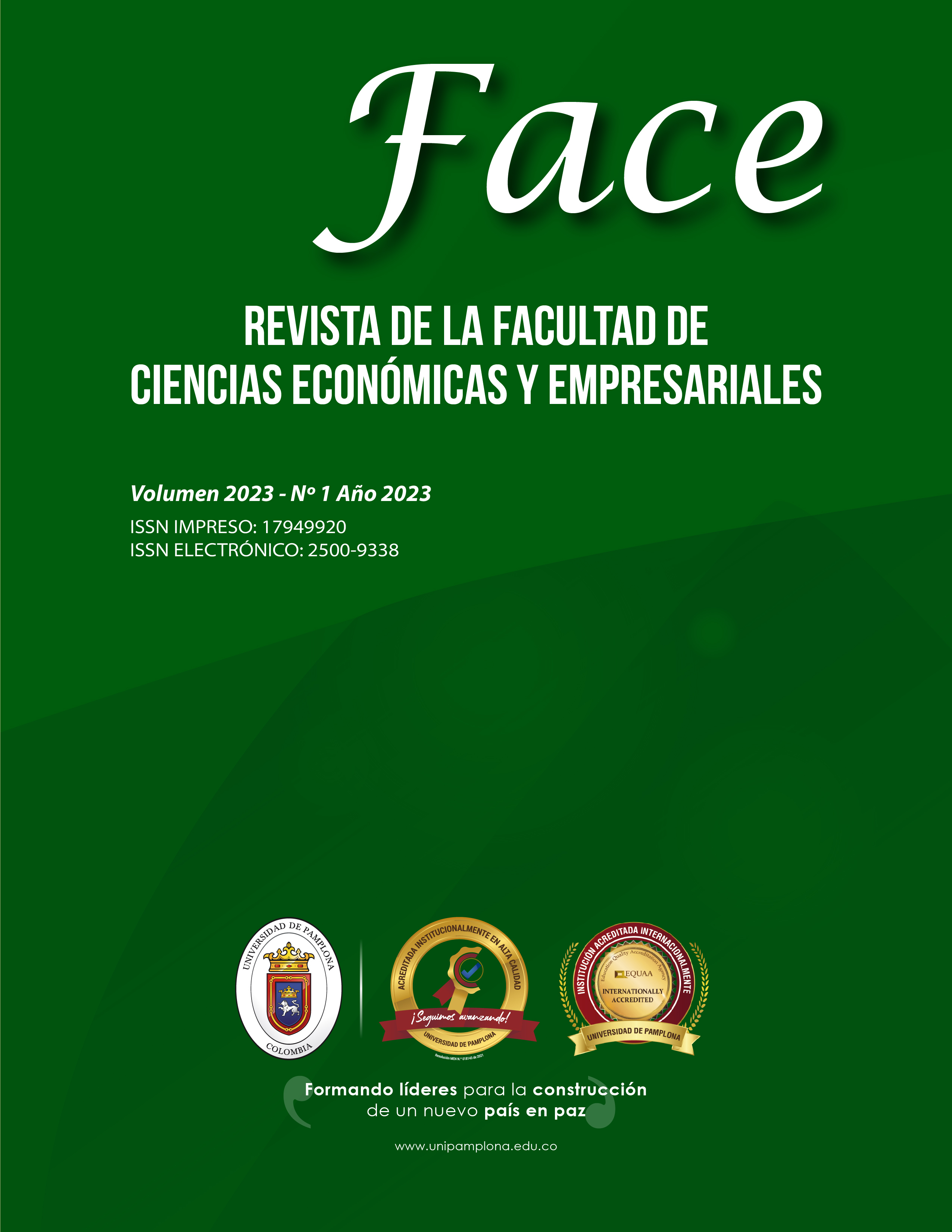CAPACITY BUILDING IN RESILIENT COMMUNITIES IN LAND MANAGEMENT KNOWLEDGE, DISASTER RISK AWARENESS, ADAPTATION AND MITIGATION TO CLIMATE CHANGE
DOI:
https://doi.org/10.24054/face.v23i1.2812Palabras clave:
Resiliencia, gestión del riesgo, planificación territorial, eventos climáticos extremosResumen
Los efectos del cambio climático y la variabilidad climática y las afectaciones por desastres naturales se encuentran relacionado a las condiciones hidrometeorológicas van en aumento, debido a esto, es necesario implementar estrategias que permitan aumentar la resiliencia en los territorios y preparar a la comunidad para la respuesta, con el objetivo de salvar vidas y reducir pérdidas. El objetivo de la realización de la investigación es proponer una nueva estructura para los sistemas de alerta temprana climatológico (SATC) ante eventos extremos del clima, como medida de adaptación al cambio climático, basado en las experiencias del sistema de alerta temprana climatológica de Norte de Santander (Colombia). en sus dos fases, ejecutadas por la Universidad de Pamplona, en alianza con la unidad nacional para la gestión del riesgo de desastres – UNGRD y la gobernación de Norte de Santander, Colombia. Esta nueva propuesta le apuesta a un nuevo Sistema con enfoque de abajo hacia arriba, desde la construcción colectiva de la gobernanza del riesgo y la corresponsabilidad en el conocimiento del riesgo, reducción del riesgo y manejo de desastres.
Descargas
Citas
Alzate Diego, Rojas Edwin and Mosquera Jemay. (2014). Climate change and climate variability for the period 1981 – 2010 in the Zulia and
Pamplonita river basins, Norte de Santander – Colombia. Blue Moon. ISSN 1909 - 2474.
Domínguez-Calle E, Lozano-Báez S. (2014). State of the art of early warning systems in Colombia. Rev. Academic Colombia. Science. 38(148):321-32.
United Nations International Strategy for Disaster Reduction - UNISDR. (2009). Disaster risk reduction terminology.
DGOAT Climate Change Group. (2018). Guidelines for the inclusion of climate change in territorial planning plans (POT, PBOT, EOT). Bogota. ISBN: 978-958-8188-92-8
IPCC, (2012). “Summary for policymakers” in the Special Report on Managing the Risks of Extreme Weather and Disasters to Improve Adaptation to Climate Change [edited by C. B. Field, C. B., V. Barros, T. F. Stocker, D. Qin, D. J. Dokken, K. L. Ebi, M. D. Mastrandrea, K. J. Mach, G. -K. Plattner, S. K. Allen, M. Tignor, and P. M. Midgley]. Special Report of Working Groups I and II of the Intergovernmental Panel on Climate Change, Cambridge University Press, Cambridge, United Kingdom and New York, New York, United States of America, pp. 1-19.López Juan David, Carvajal Yesid y Enciso Angélica. (2016). Sistemas de alerta temprana con enfoque participativo: un desafío para la gestión del riesgo en Colombia. Revista Luna Azul, 44, x-x. DOI: 10.17151/luaz.2017.44.14.
Lizarazo, A. K., Vanegas, D. and Ramón, J. A. (2018). Community participation in contextualized, prospective and sustainable Territorial Planning. VI International Congress on the Environment and Sustainable Development. University of Pamplona. Pamplona, Colombia. April 25 to 27, 2018.
Ramón, J. A. (…), Vanegas, D. and Lizarazo, A. K. (2019). “Guidelines for the structuring of territorial plans for disaster risk management with a focus on governance, climate change and early warnings.” At the 4th International Congress on Education, Technology and Science- CIETYC 2019. Universidad de San Juan and Universidad de la Guajira. San Juan, Argentina June 12 to 14, 2019.
Ramón Jacipt, Alzate Diego, Ramón Jarol. (2017). Early warning system for extreme events as a measure of adaptation and mitigation to climate change. ARGENTINE JOURNAL OF ENGINEERING - YEAR 5 - VOLUME 9 - MAY 2017
Republic of Colombia, Ministry of the Interior and Justice. (2011). Organic Law of Territorial Planning -LOOT
Vanegas, D., Celis, R. A., & Becerra, J. S. (2016). Interdisciplinary model of pedagogicaldidactic intervention that promotes a quality teaching-learning process. University and Society Magazine [online serial], ISSN: 2218- 3620, vol. 8 (1), 151-158. Retrieved from http://scielo.sld.cu/pdf/rus/v8n1/rus21116.pdf
Vanegas, D., Ramón, A.A. and Lizarazo, A. K. (2017). Community and environmental culture. Water, Air and Soil Magazine, 8(1), 36-43.
Vanegas, D. and Ramón, A.A. (2019). Cultural categories in the instrumentalization of the reading and writing process. Enunciación Magazine, ISSN: 0122-6339 (I) and 2248- 6798 (E), 24 (2), p. 267-275. DOI: http://doi.org/10.14483/22486798.14137
Vanegas, D., Ramón, J. A. & Valencia, J. D. (2015). Application of the Significant Heuristic Model in the interpretation of environmental culture. Face Magazine, 15 (2), 107 – 116. DOI: https://doi.org/10.24054/01204211.v2.n2.2015.1913
Descargas
Publicado
Versiones
Cómo citar
Número
Sección
Licencia
Derechos de autor 2023 FACE: Revista de la Facultad de Ciencias Económicas y Empresariales

Esta obra está bajo una licencia internacional Creative Commons Atribución-NoComercial-CompartirIgual 4.0.





